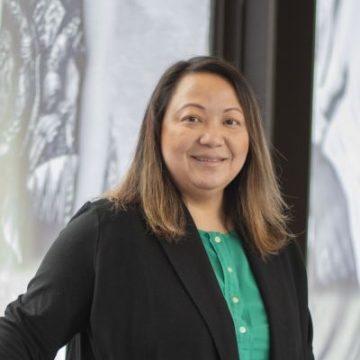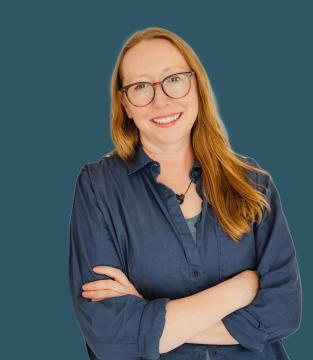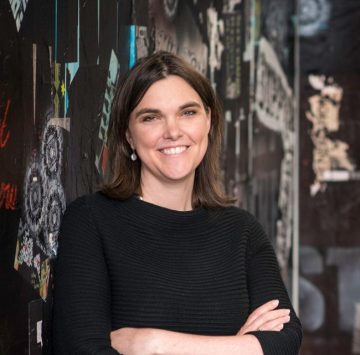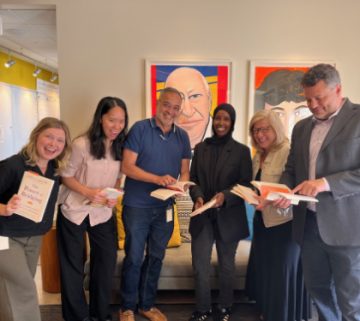Story
Stronger Together
Trailblazing Hmong leader Bo Thao-Urabe (BF’19) and the Coalition of Asian-American Leaders help communities join forces to rise above adversity
DATE
February 11, 2021

By Susan Du
The life and career that Bo Thao-Urabe (BF’19) has today is a reflection of where she started, what she hoped to achieve and how she strived to help others. Along the way, the Hmong community leader has fought discrimination and urged the embrace of progress. In pursuit of those goals, she cofounded the Coalition of Asian-American Leaders (CAAL), based in St. Paul, Minnesota, where she serves as the executive director.
From the start, she envisioned making CAAL into an umbrella organization of activists, executives, doers and helpers across sectors. Through all this, she plays a navigator role, mentoring people of color trying to make a difference in the world of nonprofits and advocating for traditionally overlooked communities to participate in shaping the future of society. She pursued a Bush Fellowship to deepen her understanding of how the finance world might recognize and reward the collectivist economies of America’s diverse cultures. With so much pandemic-related economic rebuilding ahead, the work takes on a new significance. “You have to be a visionary and practical at the same time,” she says.
Survivor’s Strength
The brutality that Bo Thao-Urabe experienced from the very start of her life, fleeing war-torn Laos, was an early lesson in surviving hardship. She was born in 1973 at the tail end of the 20-year Cold War conflicts in Southeast Asia. At 2 years old, Thao-Urabe recalls hiding in the jungle with her mother and three siblings as communist forces torched Hmong lands, massacring women and children as the men fought their way back from the front. Walking by night and leaning on other refugees they met along the way, Thao-Urabe’s family arrived at the Mekong River. Across its rushing waters was Thailand, an anti-communist monarchy where they could claim asylum. Countless sick and starving people drowned trying to swim to the other side. They reunited with her father on the Mekong’s eastern bank, crossed together and lived the next three years in a Thai refugee camp before immigrating to the United States.
“We came to this country not knowing very much except for what my parents had heard about the opportunities and what it would give their kids — the opportunity to go to school,” she says.
Imag
From there, they resettled in a one-bedroom apartment on the predominantly African American south side of Chicago. Four years later they moved to a small Wisconsin town in search of open country to farm. When she came of high school age, they moved to St. Paul so her father could train in the automotive trades. For the first time, she had other first-generation Hmong kids among her classmates. Like her, they worked to support their parents, tried to get good grades and hoped to grasp America’s mythological opportunities for prosperity.
Thao-Urabe had a gift with language. Nudged into the role of family translator, she accompanied her parents to their first jobs, doctor’s appointments and the welfare office to help fill out paperwork for food stamps and housing assistance. In classic Hmong fashion, her parents offered her assistance to other families in need. It took her no time to pick up on the condescension foisted on immigrants for speaking broken English and the restrictive conditions poor people had to comply with to prove they weren’t lazy grifters.
“When I was growing up, I didn’t realize that these were conditions that were created really just for poor people,” Thao-Urabe says. “Not until I was much older did I start to question and say, ‘Well, that’s really a crappy thing to do to those who already have so little — the amount of paperwork that people are required to complete in order to get housing assistance or food stamps.”
For example, welfare eligibility regulations required Hmong refugees to look for jobs or attend classes to become more employable. But education offerings often had cultural and language barriers, and the few jobs they could land rarely offered a health-insurance safety net. Plus, while the Hmong had been farmers for thousands of years and wanted to be farmers again, it seemed to Thao-Urabe that policymakers weren’t interested in helping them save money and navigate the banking system to acquire land.
She had to wait until after her K-12 education, which barely touched on the Vietnam War, to learn about the divergent histories and wildly different immigration stories of various Asian peoples.
The indignity was a lot for her to endure as a teenager. Growing up in America in the 1980s in a culture that valued daughters with servant’s hearts, Thao-Urabe began to open her eyes to the complicated and contradictory powers that shaped the world and her path in it.
She saw that many Americans had little understanding of the nuanced challenges within different communities of color, which large data sets couldn’t show. And, worse, ’60s-era scholarship, cultural pundits and media reports perpetuated a myth that East Asians — many of whom had put down roots for generations — were all successful and self-reliant “model minorities” compared to other people of color. A new wave of southeast Asian refugees poked a hole in that “model” stereotype, Thao-Urabe says. She had to wait until after her K-12 education, which barely touched on the Vietnam War, to learn about the divergent histories and wildly different immigration stories of various Asian peoples.
There were Hmong history classes Thao-Urabe could take in college to get the full picture. But to get there, she had to defy her family and traditional norms. In the Hmong community, male heads of households make collective decisions for the extended family. At the time, women did not hold leadership roles in their deliberative circles. One day Thao-Urabe came home from her part-time job as a medical clinic interpreter to find her uncles waiting to confront her about her college plans. Older boys had tried and failed to graduate, they warned. She’d get eaten alive and embarrass her parents. Girls married after high school.
Thao-Urabe’s mother said nothing in that moment. But she championed her daughter’s dreams of higher education and quietly strategized with Thao-Urabe’s father to get her there. In the end, all four of their daughters attended college. They were among the first generation of Hmong women to do so. “A lot of my life growing up was just getting a lot of ‘no’s,” Thao-Urabe reflects. “That built me up to try to do a lot of things without thinking too much about the boundaries.”
After college, she spent two years investigating murder-suicides in the Hmong community, in which husbands killed their wives and then themselves, orphaning the children. Working for the state of Wisconsin, she established a set of domestic violence programs before moving back to St. Paul. At 23, she became executive director of the Women’s Association of Hmong and Lao, which served marginalized war widows, where she added the association’s first sexual assault program. In both cases, Thao-Urabe’s work required her to courageously challenge Hmong patriarchal traditions, as well as members of her own family seeking to uphold them.
Next, she carried her wisdom — of how to work within the financial constraints placed on nonprofits — to Washington, D.C. and began thinking about policy: Who made it, and what informed their decisions? As executive director of the advocacy organization Hmong National Development, she worked on refugee, immigration and education policy, learning up close how laws came to pass. Afterward, she returned to Minnesota to help communities of color, including a growing Muslim population and local Indigenous tribes, build equity in her role at the Federal Reserve. She spent the next 10 years with Asian Americans/Pacific Islanders in Philanthropy, a consortium of charitable foundations.
“I’ve spent so much of my life in the [nonprofit] sector because I don’t want to make profit at the expense of human lives and I don’t want to be in sectors where humans are a means to an end,” she says. “I want to be a part of helping to improve the human condition, and be a part of thinking big about how we can cause change for greater than just the individual.”
The Conscience of a Community
In 2013, Thao-Urabe co-founded the Coalition of Asian-American Leaders (CAAL) and is now its executive director. She and other Asian Minnesotans wanted a more active role in shaping the agenda of the state. By combining their personal experiences with empirical research, CAAL could find solutions to its network of communities’ most pressing problems.
In its first year, CAAL held a forum of about 300 community leaders to devise a social justice agenda that would channel their combined assets to help those in greatest need. They convened and conversed, first disentangling the unwieldy social construct of the “Asian American community,” which was really a diverse tessellation of communities full of complexity and nuance: the richest members of society and the poorest, the most highly educated and the least, as well as those who’d been Americans for generations and those who’d just arrived.
“But still, it matters that we can embrace the identity because there are political consequences. Whether I like it or not, legislators look at data and all they see is Asian Americans,” Thao-Urabe says. “One thing that we were really set on doing was wanting the community to be powerful.”
After three years of public engagement, 2016 became CAAL’s year of action. With the community’s blessing, it helped pass Minnesota’s All Kids Count Act, which requires the Department of Education to break down overbroad student racial data into specific ethnic groupings. Large racial categories like “Asian” and “Hispanic” lump people with very different life experiences into monolithic groups. If the state’s data erase entire groups of students, Thao-Urabe explains, Minnesota can’t even begin to identify achievement gaps, let alone work to address them.
The following year, CAAL secured $1 million from the legislature for the Nonprofit Infrastructure Grant Program, which the Department of Employment and Economic Development dispenses to cultural nonprofits across the state to bolster their infrastructure, staffing and operational needs, such as technological upgrades. Shoring up these small nonprofits allowed them to continue serving their communities according to their culturally specific needs. Since 2018, CAAL has received several Bush Foundation grants to continue its work.
Throughout her early professional career, Thao-Urabe developed strategies to tackle community-level issues that still inform her role at CAAL today. Nausheena Hussain (BF’16), founder of gender equity organization Reviving the Islamic Sisterhood for Empowerment (RISE) and former deputy director of the Council on American-Islamic Relations (CAIR), considers Thao-Urabe a mentor in maneuvering inequity inside marginalized communities. “I asked her about her experience in running her nonprofit and how misogyny is an equal-opportunity oppressor. There are very few cultures where women are matriarchs,” Hussain says. “So many times, I’ve had to call her and talk to her about how to lead, how to organize, how to mobilize. She’s been a great source of strength.”
State of Emergency
After news reports traced COVID-19’s emergence to China in early 2020, Asian Americans faced increased harassment, including in Minnesota. In March, a flyer stuck to an Asian couple’s door in Woodbury, Minnesota, read, “We’re watching you [expletive] chinks. Take the Chinese virus back to China. We don’t want you hear [sic] infecting us with your diseases!” A video posted on social media in May showed two young men harassing an older Asian woman at a light rail station in St. Paul before one leapt up and kicked her in the face. A Chinese American man living in Austin, Minnesota, had the words, “China virus” burned into his front lawn in September.
CAAL reported the racist incidents they heard about. They also worked on a bill, which didn’t pass Minnesota’s divided legislature, to strengthen hate crime reporting and police response.
“There were a lot of those incidents that people all of a sudden started to experience,” Thao-Urabe says. “We know from history that when there have been other health-related situations, Asian Americans have been blamed, but it certainly doesn’t help when you have leaders who are so visible choose to do that.”
CAAL reported the racist incidents they heard about, both from the community and other Asian organizations, to the governor’s office. With the Department of Human Rights, the organization established a helpline to track what was happening. They also worked on a bill, which didn’t pass Minnesota’s divided legislature, to strengthen hate crime reporting and police response.
As pandemic restrictions set in, CAAL built out new virtual infrastructure and hired more staff to address the heightened racism targeting Asian communities, and other bread-and-butter issues its clientele faced. Immigrant parents fumbled with distance learning. Older students babysat and tutored younger ones while their parents staffed grocery stores and heart device assembly factories. Low-income, multi-generational households assumed deadly risk to do essential work. Small business owners weighed taking on more debt against losing their investments.
Early on, large foundations pooled money into the Minnesota Disaster Relief Fund, including a $1 million contribution from Bush Foundation. CAAL made sure more than 20 smaller Asian Minnesotan organizations meeting urgent community needs had access to the funds by creating $10,000 Stronger Together regrants. The small nonprofits supported by Stronger Together funds could then serve the needs of more than 40 cultural groups speaking more than 100 languages. Many of these organizations are poorly funded, have limited technology and were on their last legs amid a contracting economy.
Once businesses were allowed to reopen in 2020, Vietnamese translations of the Minnesota Department of Health’s COVID-19 preparedness guidelines weren’t initially available. A large group of nail salon owners raised this issue to CAAL, and the organization resolved the issue quickly. With access to the information, the salons could buy the proper safety equipment, and apply for the state’s relief programs if necessary. Stronger Together funds went to organizing a nail salon mutual aid group. CAAL also gave money to smaller nonprofits that did translations for other small business owners so they could tap into relief programs.
One Stronger Together recipient was RISE, which used the funding to provide Iftar Boxes to Muslim families in need during the month of Ramadan, when the fast-breaking meals are usually an important time for social gathering. They also hosted “Sisterhood at Home,” a virtual gathering of women helping each other cope with the stress of COVID-19.
Separately, CAAL awarded grants of up to $1,000 to individuals doing innovative work in communities through its own Spark Leadership Fund, which was established in 2017. The group of nearly 50 recipients in 2020 included 8th grader Alexis Chum-Phan, who sews masks for donation; street outreach worker Naida Medicine Crow, who serves the homeless; and Sun Mee Chomet, creator of “The Hard Stuff,” a video series featuring conversations between Black and Asian Americans about the United States’ racial reckoning.
“We had always had a Spark Fund that we gave to Asian Minnesotan leaders who had ideas for how to solve their community challenges, but in COVID, we decided to expand that to all BIPOC leaders,” Thao-Urabe says. “It’s not a huge idea. It’s about doing something very local and very, very specific.”
As CAAL rushed to offer communities emergency aid, the pandemic struck close to Thao-Urabe’s home. Her mother fell seriously ill in the fall and had to be hospitalized. She eventually passed away from COVID-19. Despite their best precautions, Thao-Urabe and her family also contracted the virus. They fought it and survived.
Racial Justice
In May, when a Minneapolis police officer killed George Floyd by pinning him to the pavement, one of three other officers on the scene was Asian. He’d been captured on video keeping distraught onlookers at bay. After news of Floyd’s death spread, the subsequent unrest struck many Asian-owned small businesses. After an uptick of anti-Asian hate crimes — some perpetrated by other people of color — some in the Asian community struggled with what role they should play in the uprising for racial justice.
Amid the charged environment, CAAL issued an open letter denouncing the nation’s history of anti-Blackness and calling attention to the pandemic’s disproportionate effect on communities of color. “Let us stand united for Black lives not only when lives are lost, but in everyday recognition that our liberation is tied together,” it says. CAAL created a separate organization, Asian Minnesotan Alliance of Justice (AMAJ), to focus on fighting racism against and within Asian communities. One of the first things it did is start creating a timeline of Black and Asian solidarity through civil rights history.
“We have a legacy as Asian Americans of fighting for justice and seeing ourselves as part of this broader struggle for liberation,” says Kara Carmosino, senior manager of social justice leadership at CAAL. “Part of the work is recognizing where some of this anti-Blackness comes from.”
During Minneapolis’ end-of-year budget negotiations, CAAL supported the “People’s Budget,” a plan proposed by activists to redirect $53 million from police funding and invest it in alternatives like rapid-response mental health teams, wage theft investigators and harm-reduction drug use sites.
In March of 2021, eight people were killed in a violent attack targeting three Georgia spas. Six of the victims were of Asian descent. CAAL responded with a letter directed to the Asian Minnesotan community as well as non-Asian allies. “Don’t let systems divide us,” the letter says. “We can work together to combat anti-Asian racism as we move towards healing and justice.” CAAL also organized an event to honor the Georgia victims and a community forum featuring Thao-Urabe, U.S. Rep. Ilhan Omar and Minnesota Department of Human Rights commissioner Rebecca Lucero among the speakers.
Seeking Inner Balance
During a challenging year, Thao-Urabe’s Bush Fellowship term, which began in 2019, evolved as she responded to her community’s immediate needs. Her own needs changed, as well. In the span of 12 months, she lost both of her parents, “the two most influential people in my life.”
“Through my life’s work I’ve learned that we need social justice leaders — not just activists in the moment,” she says. “There are only a handful of folks who’ve stayed in it, because it’s exhausting to confront all the time. You can’t do it on a daily basis, but you’ve got to be in the movement all your life.”
In a reflective piece on her Fellowship journey written in late 2020, she describes a need to build self-care into the experience. To her, community care came along with her own personal care, so she hired a somatic coach to promote mind-body wellness within her team at CAAL. She also held sessions with a group of BIPOC women and gender nonconforming healers. For the future, she is exploring what a physical space or a training institute practicum for healing could look like.
She had intended to spend her Fellowship on a self-directed study of “solidarity economics.” But when the pandemic struck, she realized she wouldn’t be able to travel to Scandinavia, Hawaii, New Zealand and other places where she’d intended to observe Indigenous cooperatives. Instead, she connected with individuals across the United States virtually while completing her research from home. Her findings fed directly into a CAAL economic report, “Redefining Wealth Through Communal and Cultural Assets,” released in early 2021.
“When you’re the executive director, what you take up influences your organization” she says. “The research talks about what actually happens in communities — regardless of what systems do. CAAL is not a research institute. Our research propels our short-term and long-term strategies to move community priorities. It’s both about facilitating reimagination and a reality check of where we’re at.”
“Redefining Wealth” is CAAL’s latest data disaggregation project for greater understanding of Asian Minnesotan communities. Previously, CAAL tackled education data for a 2015 report, and a 2018 report analyzed poverty and wealth data. The latest report shows how Asian Minnesotans define wealth in many ways beyond money and possessions. For instance, the social and cultural capital elders possess is potentially at risk as relationships become more financial.
Additionally, while many of the world’s economic models are based on an individualistic framework, Thao-Urabe explains, communities of color the world over have survived by forging tight-knit support networks, starting businesses by pooling resources and dividing risk. CAAL’s 2021 report confirms Asian Minnesotan families use these saving and lending circles to support each other.
“In many of our communities, we’ve been able to not only survive, but in some cases ‘make it’ because we have the help of others,” Thao-Urabe says. “Especially in this pandemic, we know that government won’t have enough. Private resources won’t have enough. And it would take a lot of communal support in order to truly recover.”
The next phase, Thao-Urabe says, is to ideate and prototype based upon communal approaches to finance. She has discussed small pilot programs with banks that could provide automation features and help raise credit scores for participants in a way that private saving circles currently do not. Technology and laws would also have to change to make it a reality, she says.
“I am so excited by what we might try,” she says of the economic work ahead. “And it’s not just about leading an Asian American movement. We can’t move forward and compartmentalize people’s identities while economic disparities are getting larger. I work from the perspective of representing people who are most impacted through a collective. It’s about people’s real lives.”
Susan Du covers Minneapolis for the Star Tribune.
Continue reading
-

News
Welcome to new Bush staff members
We are celebrating some new Bush colleagues and hope you get to meet them soon!
-

Note from Jen
Protecting our freedom to give
Do you know how CPR came to be? What about the 911 system? Ever wonder who developed the Pap smear? Or why school buses are all the same color? All these were the results of work funded by some foundation.
-

News
Introducing the Bush book club
Join us as we learn how to build a world where we all belong. And stay tuned as we get ready to welcome john a. powell to Minnesota for a special Bush book club event!